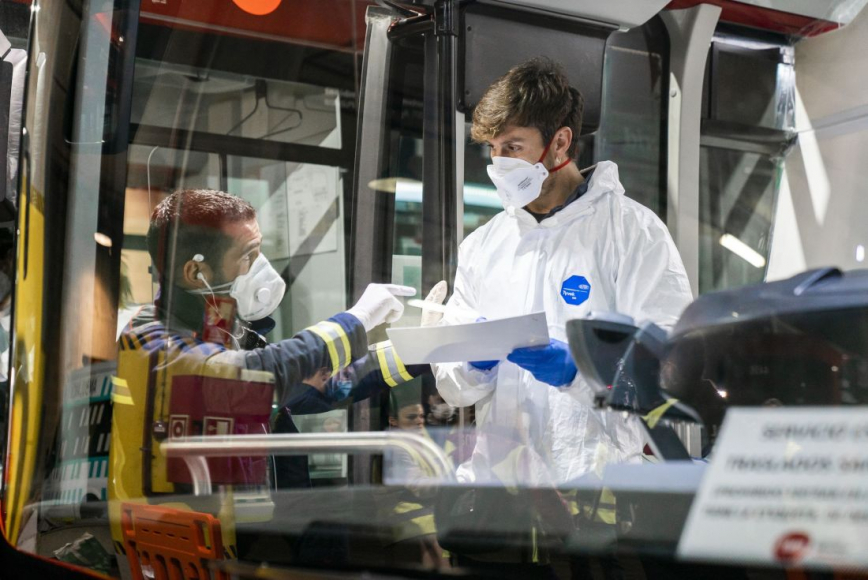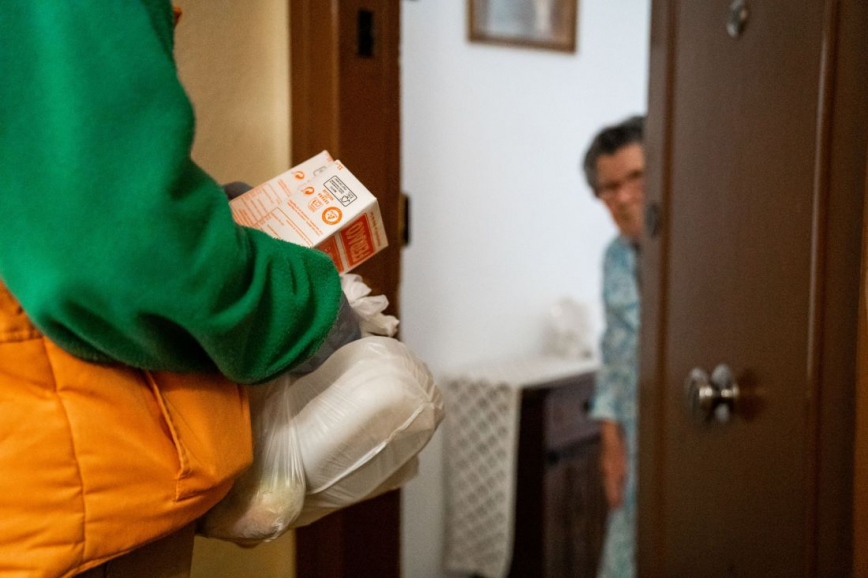How can we deal with a complex emergency?
- Urban visions
- Jan 22
- 10 mins
The health and social emergency triggered by the COVID-19 crisis has represented a major challenge for municipal government administration in Barcelona. L’experiència de la crisi a l’Ajuntament n’ha mostrat les debilitats, such as the public administration’s limited digital transformation, but also its strengths, such as the capacity to anticipate, the creation of collective and shared leaderships, and cooperation with other agents to achieve a common goal.
Local governments have become fundamental when it comes to mitigating the effects of the COVID-19 pandemic due to their proximity to the community’s needs and their knowledge of the territory (see “The territorial impact of COVID-19: Managing the crisis across levels of government ”, OECD, 2020). They have made a decisive contribution to reducing the spread of the virus, to guaranteeing essential public services taking socio-territorial differences and inequalities into account, and to planning and simultaneously rolling out recovery measures that are better adapted to the reality of each municipality. This task has often been carried out silently, always behind the leading role played by the central government and the autonomous communities.
The Spanish State had a delayed response, once community transmission was detected in Italy, as it was in the rest of Europe and the European Union itself. In this context, Barcelona City Council responded in an agile manner and even in advance. Barcelona’s municipal response began on 26 February, when the City Council created the Coordination and Monitoring Committee for the COVID-19 Contingency Plan. The Mayor’s Decree, on 11 March, which set the preparation of contingency plans in motion, was approved two days before the Royal Decree declaring the state of emergency. Among the urgent measures taken, mention must be made of the assembly of Medical Pavilions [field hospitals]: on Wednesday 25 March the team was created to bring this goal to fruition and on 29 Sunday the first field hospital adjacent to the Vall d’Hebron hospital was officially opened, equipped and operational.
 The sports venue of the Vall d’Hebron Municipal Hall became an extension of the Vall d’Hebron Hospital to care for Covid-19 patients at the outset of the pandemic. In the picture, a coordination meeting among the health staff of the Vall d’Hebron field hospital. © Barcelona City Council / Isaac Planella
The sports venue of the Vall d’Hebron Municipal Hall became an extension of the Vall d’Hebron Hospital to care for Covid-19 patients at the outset of the pandemic. In the picture, a coordination meeting among the health staff of the Vall d’Hebron field hospital. © Barcelona City Council / Isaac PlanellaBarcelona City Council announced a total of 176 actions during the first wave of the pandemic, until the end of July 2020. While health services grabbed social and media attention, Barcelona City Council had to undertake measures in the following areas in particular: social services (23% of actions); education, culture and sport (19%); and the economy, trade and tourism (19%). The primary goal was to mitigate the spread of contagion, but also to help the groups and sectors most affected by the pandemic’s control measures. To fulfil these objectives, new public services had to be rearranged and generated, guaranteeing the safety of the municipal workers themselves and of the collaborating companies and entities.
The emergency has meant a great challenge for municipal government administration. It has shown its weaknesses, such as the public administration’s limited digital transformation, but also its strengths, linked to proximity and the capacity to anticipate.
So-called “complex” emergencies, such as the COVID-19 pandemic, are characterised as such because of the prolonged nature of the persistence of danger, the management of the emergency and the recovery.
What have we come up against?
The emergencies that Barcelona City Council had come up against before COVID-19 had been much more limited in time, magnitude and scope. Examples include Storm Gloria and the attack on the Ramblas or, looking back, the collapse of a tunnel in the neighbourhood of El Carmel on account of the construction of the L9 metro line. Although they were difficult emergencies, they were not comparable to what we have experienced in the last year and a half.
Although this is not the first pandemic that humanity has faced, the emergency and the crisis arising from COVID-19 are part of a new type of emergency qualified as “complex” (see “Towards a Concept and Framework for Governing Complex Emergencies”; UCLG, Metropolis and LSE Cities, 2020). So will the future meteorological, energy or food emergencies that stem from the climate crisis be too?
What are the characteristics of complex emergencies? Firstly, they are more unpredictable and their causes lie in the context of global phenomena, so without good multi-level governance, they are very difficult to control. In addition, as their effects are differential according to the territory, they also call for proximity-based management.
Secondly, they are characterised as such because of the prolonged nature of the persistence of danger, the management of the emergency and the recovery. The first sprint-like response (swift and effective action to control risk) moves onto a marathon with different stages. To tackle them, not only must emergency services be set in motion, but risk mitigation actions must be combined simultaneously with compensatory and transformative actions involving other knowledge and services.
 A firefighter talks to one of the TMB volunteers who is already on the solidarity bus. The task of these volunteers was to transport patients affected by Covid-19 and discharged from hospital but prescribed quarantine in specific facilities. © Barcelona City Council / Clara Soler Chopo
A firefighter talks to one of the TMB volunteers who is already on the solidarity bus. The task of these volunteers was to transport patients affected by Covid-19 and discharged from hospital but prescribed quarantine in specific facilities. © Barcelona City Council / Clara Soler ChopoThirdly, mitigation measures in such emergencies (e.g. the lockdown) call for social acceptance, as they bear negative effects for other areas (e.g. economic activity or mental health). That means that good communication and risk management are key.
Finally, due to the extension in time, the inability to provide clear responses and their direct and indirect repercussions, complex emergencies bear a destabilising effect on societies, although they also carry a transformative potential.
Barcelona City Council, like the other authorities, was not prepared to deal with an emergency like the one we have experienced. But COVID-19 has forced it to adapt to an exceptional situation. Adaptability is fundamental in a crisis like this one, and calls for organisational adaptation to the new situation without crumbling, ensuring the City Council’s basic functions are upheld and new demands are addressed at the same time. Four major areas can be distinguished under adaptability: regulation, decision-making, leadership and institutional capacity.
In organisations subject to public law, such as Barcelona City Council, legal order must be guaranteed in its internal operations.
Ensuring and adapting the legal order in situations of exceptionality
In organisations subject to public law, such as Barcelona City Council, legal order must be guaranteed in its internal operations. The emergency led to a major change in the current order due to the declaration of the state of emergency. To adapt to the new situation of legal exceptionality, the organisation’s regulation had to be amended: the classification of essential and non-essential services; the development of contingency plans; the adoption of teleworking, and the revision of administrative processes related to purchasing, public procurement and subsidies.
Ensuring the introduction of regulations that adapt to the emergency’s evolution was one of the fundamental needs to ensure the organisation’s smooth functioning. This materialised in the need to amend the decrees already approved, as in the case of the decree on internal organisation or the decree on public procurement.
A key initiative to deal with the emergency in an agile manner was the creation of specific working groups (known as “offices”) with great capacity for cooperation with the Government of Catalonia in those areas in which it was necessary.
Mission-based working groups
Given the characteristics of the complex emergency, the emergency services (city police force, fire service, civil protection) relinquished their centrality in decision-making spheres in favour of more plural and cross-cutting ones. In our case, the Coordination and Monitoring Committee of the COVID-19 Contingency Plan was Barcelona City Council’s main arena for steering the emergency response.
 Two members of the Social Services talk to homeless people camped around the Palau d’Esports sports arena on Carrer de Lleida, very close to Hall No. 7 in the trade fair grounds, which was set up to accommodate the homeless during the lockdown. © Barcelona City Council / Laura Guerrero
Two members of the Social Services talk to homeless people camped around the Palau d’Esports sports arena on Carrer de Lleida, very close to Hall No. 7 in the trade fair grounds, which was set up to accommodate the homeless during the lockdown. © Barcelona City Council / Laura GuerreroA key initiative to deal with the emergency in an agile manner was the creation of specific working groups (known as “offices”) with great capacity for cooperation with the Government of Catalonia in those areas in which it was necessary. Most of the offices did not correspond to pre-existing structures in the City Council and were teams created specifically to fulfil the mission assigned to them, whether to set up hospital extensions in sports facilities, to contain the spread of the pandemic in nursing homes or to ensure the reopening of municipal facilities in safe and secure conditions. All offices have been heavily results-oriented, made up of multidisciplinary teams and with great autonomy for decision-making, management and execution once their mission was defined.
The knowledge of the Barcelona Public Health Agency has also proven vital, both in the COVID-19 Committee and in the working groups in need of it, to reduce uncertainty and strengthen the capacity for anticipation when making decisions.
The setting up of an internal roster of volunteers has been a new development and a way of conveying solidarity within the organisation.
Leadership and communication based on empathy and proximity
Having leadership that can prioritise and orientate the entire organisation towards clear goals becomes essential in crisis scenarios. Also crucial is empathetic leadership, understanding personal situations of confusion, fear and malaise, and pointing to a positive way out of the crisis. This has been precisely the main message of the municipal management to the whole organisation through the different channels of internal communication. Crises are also times of expression of solidarity, of collective effort and of individual motivation that must be conveyed. The setting up of an internal roster of volunteers has been a new development and a way of conveying solidarity within the organisation.
Governance of the emergency has highlighted the leadership role that district managements can come to acquire, not only in implementing but also in generating knowledge and making more targeted decisions in each territory. On the other hand, although decentralisation into areas, entities and districts of Barcelona City Council has been a strong point in the execution and agility of the response, the fragmentation of the information that this entails also posed a difficulty to management, especially during the onset of the pandemic.
 An elderly lady opens the door to the delivery person from the “Àpats en companyia” [Meals in Company] programme run by Barcelona City Council, who is delivering the package of food with gloves. The City Council increased the number of meal programmes for vulnerable people by 30% as of the beginning of the pandemic. © Barcelona City Council / Clara Soler Chopo
An elderly lady opens the door to the delivery person from the “Àpats en companyia” [Meals in Company] programme run by Barcelona City Council, who is delivering the package of food with gloves. The City Council increased the number of meal programmes for vulnerable people by 30% as of the beginning of the pandemic. © Barcelona City Council / Clara Soler ChopoThe decentralisation of contingency plans
The existence of a professional leadership and managerial structure, accustomed to the tasks of governance, coordination and management of human and material resources, also explains the institutional capacity to deal with this type of emergency. Much of the organisational stress has also focused on this managerial structure.
The implementation of contingency plans in a decentralised manner in the realm of management, entities and districts has facilitated rapid planning, adapting them to each area specifically. But a more in-depth appraisal is needed on how to improve this mechanism for future complex emergencies, determining what has proven useful and what has not in these contingency plans. The services declared essential also need to be revised, regardless of whether they operate face to face or online.
Beyond the lack of protective equipment at the outset of the crisis, the main stumbling block has undoubtedly been that the organisation was not prepared for remote work.
The public administration’s (limited) digital transformation
Beyond the lack of protective equipment at the outset of the crisis, the main stumbling block has undoubtedly been that the organisation was not prepared for remote work. Nor were the processes fully digitised, nor did the staff have the necessary training or equipment, nor was the City Council’s technological infrastructure ready for remote work in the scope that the situation required. This factor has significantly hindered the organisation’s work capacity to continue performing many of its usual functions.
The tremendous effort of the Municipal Institute of Information Technology and self-education on the part of municipal workers allowed the initial difficulties to be overcome, although the City Council’s digital transformation must continue to be enhanced.
A driver for innovation
We can say that the coronavirus crisis has both generated and accelerated innovations within the municipal organisation and its policies. The crisis has represented a window of opportunity both to promote internal management changes and to set new social, educational, health, economic and urban policies in motion.
The innovations introduced or enhanced during the COVID-19 crisis at Barcelona City Council, rather than consisting of merely adapting to an exceptional situation, reinforce many of the desirable characteristics in a government administration: agility, responsiveness, shared and collective leadership, the leveraging of the skills of municipal staff beyond their positions, cooperation with other agents to achieve a common goal, more oriented towards results than towards adherence to procedures, and the capacity to experiment with and scale new solutions.
We must continue working to institutionalise many of the lessons learned and innovations tested during the COVID-19 crisis so that Barcelona City Council becomes a more resilient organisation when faced with complex emergencies in the future.
Note
The content of this article was drawn up on the basis of the finding of the study “La governança de l’emergència complexa de la covid-19: actuacions, adaptació organitzativa i innovacions de l’Ajuntament de Barcelona” [Management of the Complex Emergency of COVID-19, Organisational Adaptation and Innovations at Barcelona City Council].
The newsletter
Subscribe to our newsletter to keep up to date with Barcelona Metròpolis' new developments




